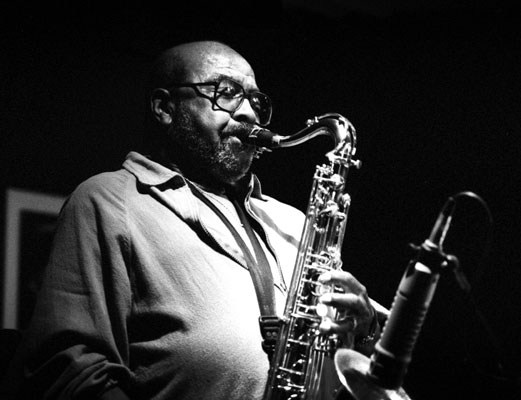
James Moody (March 26, 1925[1] – December 9, 2010) was an American jazz saxophone and flute player and occasional vocalist, playing predominantly in the bebop and hard bop styles. Moody was an international jazz star since 1949. Quincy Jones called him a national treasure. Moody was known for his virtuosic playing, his ability to seamlessly blend distinctive styles, and his infectious personality. He was a master of the saxophone and the flute, and his music remains an inspiration to musicians and jazz lovers all over the world.
Moody was born in Savannah, Georgia in 1925. He was raised by his single Mother, Ruby Hann Moody Watters in Newark, New Jersey. Moody was born partially deaf. Mrs. Watters enrolled him in Bruce Street School for the Deaf. He first became interested in music as a child, and his Uncle Louis bought him his first saxophone when he was 16 years old. He graduated from Arts High School as did Sarah Vaughn and Wayne Shorter.
Moody was drafted into the segregated US Army Air Corp, where he played in the “Negro” band and honed his skills as a saxophonist. It was during the 1940’s and 1950’s that Moody’s career began to take off. He became known for his virtuosic playing and his ability to play in a wide range of styles, from swing and bebop to Latin jazz and beyond. His fluid, soulful playing and his distinctive sound made him a jazz legend.
In 1949, in Stockholm, Sweden Moody recorded his first album as a bandleader, “James Moody and His Modernists,” which featured the iconic track “Moody’s Mood for Love.” The song was based on the chord changes of “I’m in the Mood for Love” and featured Moody’s improvisation of the melody. It became a global hit. Eddie Jefferson wrote lyrics which King Pleasure recorded and it went on to be referred to by many as “The Jazz National Anthem,” and was covered by countless musicians over the years, including Amy Winehouse, Van Morrison, Take 6 and Queen Latifa to name just a few. During an interview Moody once said, “If I don’t do that song, I may as well not show up.” In 2001 “Moody’s Mood for Love” was inducted into the Grammy Hall of Fame, honoring recordings with historical significance.
Moody became known for his masterful improvisational skills at the flute, an instrument that was not commonly used in jazz at the time. Moody’s flute playing was characterized by its warmth, lyricism, and soulfulness. Two months after receiving his flute he recorded “Flute’n The Blues.”
In the 1960’s, Moody became a member of The Dizzy Gillespie Quintet. The group’s performances and recordings are still considered to be some of the most important and influential in the history of jazz. Moody’s playing was marked by his ability to seamlessly blend distinctive styles and to infuse his playing with his own unique personality and humor. Dizzy once said, “Playing with James Moody is like playing with a continuation of myself.”
In 1997, Moody had the pleasure of playing Mr. Glover in Clint Eastwood’s Midnight in the Garden of Good and Evil. In 1998, he received the NEA Jazz Master Award and in 2000 was presented with an Honorary Doctorate from the Berklee College of Music and an Honorary Doctorate from Florida Memorial College. Moody was a 4-time Grammy nominee and a recipient posthumously in 2011.
In 2005, Moody and his wife, Linda, founded the James Moody Scholarship at Purchase College, New York, and, in early 2011 Linda in memory of her beloved husband, founded the James Moody Scholarship for Newark, NJ which partners with Jazz House Kids. Each scholarship awards a qualified student $10,000 toward college tuition.
Moody continued to perform and record well into his later years, and he remained an active and much beloved figure in the jazz community until his death from pancreatic cancer on December 9, 2010. He was known for his generosity and his willingness to share his knowledge and experience with younger musicians. Linda and Moody were a devoted couple for almost 22 years of marriage, always holding hands and exchanging loving glances. Linda is the keeper of the flame of the Moody Legacy. According to esteemed writer, George Varga, “Mr. Moody leaves behind one of the longest and most distinguished jazz careers in memory.”
Throughout his career, James Moody’s innovative and soulful playing helped to define the sound of jazz. His ability to seamlessly blend distinctive styles and to infuse his playing with his own ebullient personality and humor made him one of the most beloved figures in the history of the genre. His influence can still be heard in the music of countless musicians today, and his legacy as a musician and as a beloved figure in the jazz community continues to live on.